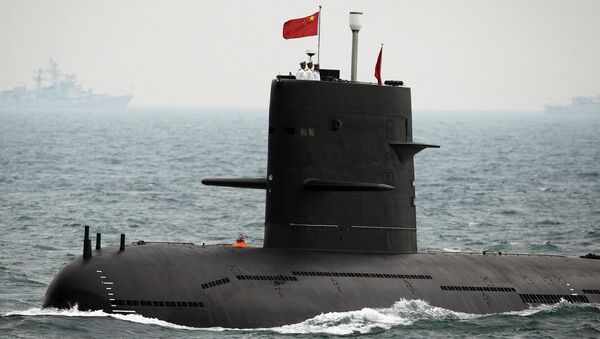The deepest a laser device has been able to penetrate through ocean water and still provide reliable results so far is 200 meters, a depth record set by a device created by the Pentagon's Defense Advanced Research Projects Agency (DARPA), according to the South China Morning Post.
Beijing's new effort, which began in May, was launched by the Pilot National Laboratory for Marine Science and Technology in Shandong Province, the Post reported Monday, noting that an additional 20 institutes and universities in the country are working on designing the satellite.
If successful, the satellite's laser beam could zero in on a submarine and shoot back pulses to the satellite that would be analyzed to pinpoint the vessel's location, three-dimensional shape and speed. The beams, used in conjunction with microwave radar technology, would be able to scan areas as wide as roughly 100 kilometers or focus on areas measuring just 1 kilometer.
However, not all is likely to go smoothly, since the Light Detection and Ranging (lidar) technology being used to scan the ocean could create some troubles for officials. According to the Post, obstacles including clouds, fog, murky waters and fish could cause the satellite to report false submarine detections or just flat out fail to produce results due to the beam's inability to penetrate deep into the waters.
The matter of the beam being deflected is a top concern among officials, with some suggesting that the project's hope of penetrating some 500 meters below the surface is just not possible.
"Five hundred meters is ‘mission impossible,'" an anonymous lidar scientist from the Shanghai Institute of Optics and Fine Mechanics who is not involved with the project told the publication. "[Project researchers] won't be able to break through the darkness guarded by Mother Nature — unless of course they are Tom Cruise, armed with some secret weapons."
Beijing's decision to proceed with the project is a potential breakthrough offered by a new, as-yet-unexplained "innovative approach" that hasn't been attempted in the past, a scientist involved in the project told the Hong Kong-based outlet.
Presently, it's unclear when the satellite is intended to go live. Zhang Tinglu, a researcher who spoke on the record and is involved in the project, told the Post that "there's still heaps of problems that we need to solve."
As China prepares to dive deeper with its underwater surveillance capabilities, the nation is also looking to expand its goals in space. China's lunar program, which is expected include four moon missions, will see its first leg begin by the end of the year, Sputnik previously reported.





